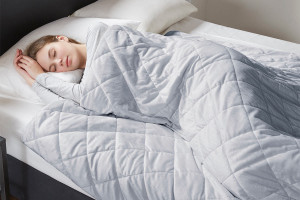
If you often get complaints from your spouse about your disgusting and disturbing snore at night, don’t wait until your bed partner compares your snore to terrible things such as a lawnmower, wrestling pigs, and a freight train.
Snoring is a health condition that affects approximately 80 million Americans. Additionally, 37 million adults are snoring on a regular basis.
What is Snoring
Snoring is the result of a narrowed airway which decreases the free movement of air that normally enters your air passage. This creates a vibration of tissues and the uvula that leads to a noisy and distressing snoring sound.
Why Should I Take Snoring Seriously
You’re a lucky person if you do not snore or if you don’t have a snoring spouse or bed partner. But for those parties affected by snoring, this health condition should be taken seriously.
Snoring poses different health risk conditions such as depression, hypertension, stroke, GERD, dementia, and diabetes.
A snoring spouse or bed partner can be a threatening factor that can tear a relationship or marriage apart. In fact, snoring has become of the main medical reasons for divorce.
Snoring can affect the quality of your sleep. It disrupts the restoration and repair process our body undergoes every time we sleep.
Several studies show that sleep deprivation caused by snoring may lead to depression.
Common Causes of Snoring
- Weight gain or obesity
Have you gained a lot of weight lately? A few weeks later, your spouse or bed partner has been complaining about your annoying snore at night. Can you blame it on your recent weight gain?
When you’ve gained extra weight, those excessive fats tend to build up throughout your neck and throat. This situation can restrict your airway which leads to snoring.
- Sleeping position
The way you sleep at night can determine your tendency to snore. Yes, your sleeping position influences your tongue to fall into your airway. This happens when you sleep on your back.
Sleeping on your back affects your tongue that may lead to a narrowed airway. Air can hardly enter a narrowed airway which triggers tissue vibrations, thus causing snoring while you sleep.
- Nasal congestion due to allergies
Allergies, dust, hay fever, environmental irritants, cold, nasal polyps, and a deviated nasal septum can cause nasal congestion.
You have the tendency to breathe through your mouth instead of your nose when you have nasal congestion. This produces a negative pressure behind your uvula and soft palate that results in snoring.
- Old age
Nobody can defy old age because it is an inevitable fact of life that everyone gets old. Getting old decreases muscle tone and reduces physical activities that can lead to weight gain. These two factors give rise to snoring.
- Gender factor
It’s been an established fact that men snore more than women. The wife is the one who complains the most about her snoring husband.
Men’s airways are larger compared to women’s. This airway size allows more space to accommodate tissue vibration that activates snoring.
- Alcohol
Many believe that alcohol consumption is good if you want to fall asleep fast. But this notion can only lead to snoring which is very annoying.
The sedative effect of alcohol is the reason why your sleeping partner complains about your snore. Alcohol triggers the muscles in your throat to relax which ends up in a hoarse and noisy snoring sound.
7 Useful Tips to Avoid Snoring
- Deal with your allergies
Regular cleaning of your bedroom helps a lot when it comes to getting rid of allergens. You have to clean every corner of your room. Some hidden allergens can stay in your room if you don’t do a thorough cleaning.
Allergies can induce nasal congestion that leads to snoring. Discuss your situation with your doctor so he can give you the best way of treating your allergies.
- Quit smoking
It’s been an elusive pursuit for many people to quit smoking. But doing so produces a lot of health benefits. Consult a doctor who can assist you to gradually quit smoking.
- Lose Weight
Losing weight prevents the accumulation of fats around your neck. It’s important to take note though not everyone who gains weight has the tendency to snore.
Cultivate an active and healthy lifestyle by engaging in activities such as running, swimming, playing basketball or tennis, or doing the famous Zumba dance. Doing any of these activities has health benefits that boost your overall health. And this includes putting an end to your snore so you can finally get a good night’s sleep.
- Change your sleeping position
Sleep on your left side so your tongue won’t tend to fall back into your throat. If you’re struggling to maintain this sleep position, trying using a pillow by hugging it while you sleep. Sleep doctors in the US have recommended this sleeping position.
- Limit alcohol consumption
Cutting back on your alcohol consumption can help relieve your snoring at night. If it’s really difficult for you to stop consuming alcohol, then do not indulge in alcoholic beverages at least 5 hours before bed.
- Use essential oils for snoring
Essential oils have been known for their healing qualities that include snoring. The essential oils of marjoram, thyme, tea tree, eucalyptus, peppermint, and lavender have been known to alleviate snoring.
These essential oils have anti-inflammatory, anti-bacterial, antiseptic, and antispasmodic properties that can stop snoring triggered by nasal congestion, swelling, and allergies.
- Consider Anti-Snoring Devices to Avoid Snoring
Anti-snoring devices help alleviate the snoring sound of your bed partner and bolster better sleep.
- Chin Straps.-If you’re an open-mouth snorer, chin straps prevent your jaws from falling backward so they are kept in place when you sleep at night.
- Nasal Strips. -This anti-snoring appliance opens your nasal passages automatically so you can properly breathe through your nose. Nasal strips create nostril expansion every time you breathe.
- Snoring Pillows. -Anti-snoring pillows work by maintaining a good position for your neck and head to avoid obstruction of the airway. This is to ensure that your airway is always open during your sleep.
- Nasal Dilators. –Nasal dilators keep your nostrils open to avoid possible blockage that will affect your nasal passages.
- Snoring Mouthpieces. -Snoring mouthpieces can lessen or eliminate snoring by disconnecting the parts of your mouth that induce vibration of the uvula and surrounding tissues.








